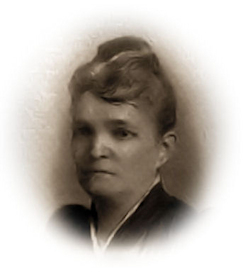Nov. 20, 1862. (Vicksburg.)—A fair morning for my journey back to Vicksburg. The autumn woods were shining through a veil of silvery mist and the spicy breezes blew cool and keen from the heart of the pines, a friend sat beside me, a husband’s welcome awaited me. General Pemberton, recently appointed to the command at Vicksburg, was on the train; also the gentleman who in New Orleans had told us we should have all the butter we wanted from Texas. On the cars, as elsewhere, the question of food alternated with news of the war.
When we ran into the Jackson station H. was on the platform, and I gladly learned that we could go right on. A runaway negro, an old man, ashy colored from fright and exhaustion, with his hands chained, was being dragged along by a common-looking man. Just as we started out of Jackson the conductor led in a young woman sobbing in a heart-broken manner. Her grief seemed so overpowering, and she was so young and helpless, that every one was interested. Her husband went into the army in the opening of the war, just after their marriage, and she had never heard from him since. After months of weary searching she learned he had been heard of at Jackson, and came full of hope, but found no clue. The sudden breaking down of her hope was terrible. The conductor placed her in care of a gentleman going her way and left her sobbing. At the next station the conductor came to ask her about her baggage. She raised her head to try and answer. “Don’t cry so, you’ll find him yet.” She gave a start, jumped from her seat with arms flung out and eyes staring. “There he is now!” she cried. Her husband stood before her.
The gentleman beside her yielded his seat, and as hand grasped hand a hysterical gurgle gave place to a look like Heaven’s peace. The low murmur of their talk began, and when I looked round at the next station they had bought pies and were eating them together like happy children.
Midway between Jackson and Vicksburg we reached the station near where Annie’s parents were staying. I looked out, and there stood Annie with a little sister on each side of her, brightly smiling at us. Max had written to H., but we had not seen them since our parting. There was only time for a word and the train flashed away.
Note: To protect Mrs. Miller’s job as a teacher in post-civil war New Orleans, her diary was published anonymously, edited by G. W. Cable, names were changed and initials were generally used instead of full names—and even the initials differed from the real person’s initials. (Read Dora Richards Miller’s biographical sketch.)
